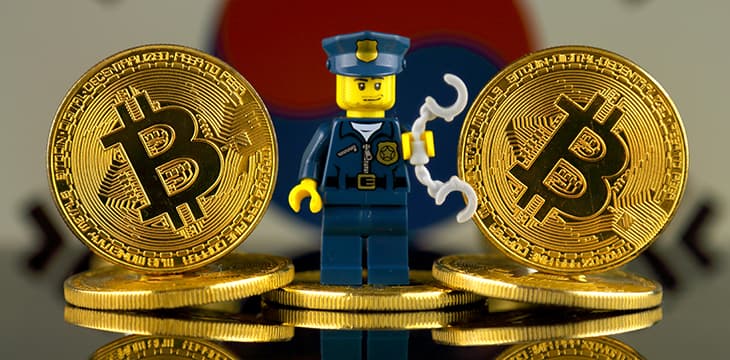|
Getting your Trinity Audio player ready...
|
South Korea’s efforts to nab Do Kwon, the founder of Terraform Labs and its LUNA and UST tokens, are now moving toward cutting off his finances. In the latest move, Korean authorities have ordered two leading exchanges to freeze two BTC accounts reportedly owned by Kwon-affiliated Luna Foundation Guard (LFG). However, Kwon and LFG have denied any links to the accounts even as the Korean claims that he hasn’t been hiding from authorities.
According to one report, the 3,313 BTC was transferred to KuCoin and OKX exchanges shortly after Korean authorities issued an arrest warrant against Kwon on September 14. CoinGeek reported that authorities accused Kwon and five of his colleagues at Terraform Labs of violating the Capital Markets Act.
Efforts to capture the 31-year-old have quickly escalated, with South Korea requesting Interpol’s assistance and the global law enforcement authority issuing a Red Notice against Kwon recently.
All along, the Terra founder has maintained that he isn’t running from authorities, but he has refused to disclose where he currently resides.
Blockchain sleuths at CryptoQuant revealed that LFG opened a new wallet on Binance on September 15, the day after the arrest warrant was issued. The company linked the wallet to LFG using “transaction patterns, adjacent flows, and material non-public information,” it said.
In the days that followed, this wallet transferred 3,313 BTC to KuCoin and OKX, worth over $61 million at press time. This stash is believed to be part of the $1.5 billion worth of BTC that LFG purchased earlier this year as reserves for its UST algorithmic stablecoin.
KuCoin quickly cooperated with authorities, reportedly freezing 1,354 BTC ($25.2 million) in a recently-created wallet. A spokesperson for the exchange stated that “it’s willing to cooperate with any global law enforcement agencies when it comes to cases of investigations about the origin and freezing of suspected assets.”
OKX was hesitant, with some reports claiming “ignoring the prosecution’s request to freeze assets.” However, an OKX spokesperson cleared the air, revealing to media outlets that “OKX can confirm that it has received a request from the Korean authorities and that it is cooperating with their investigation.”
‘That’s not our BTC’: Do Kwon and LFG deny links
Just as he has adamantly denied any claims that he has been hiding from Korean authorities, Kwon has denied any links to the BTC stash.
“There is no “cashout” as alleged, I haven’t used kucoin or okex in at least the last year, and no funds of tfl, lfg or any other entities have been frozen,” he claimed on Twitter.
What has been probably the most surprising in all this is the amount of misinformation that gets spread.
There is no “cashout” as alleged, i havent used kucoin or okex in at least the last year, and no funds of tfl, lfg or any other entities have been frozen. https://t.co/E1cbKgoqQz
— Do Kwon 🌕 (@stablekwon) September 28, 2022
The LFG also denied links to the two frozen wallets and even listed its “only” BTC wallet. Blockchain data shows that this wallet has received over 71,000 BTC (worth about $1.3 billion) but currently holds just 313 BTC, worth $5.9 million.
The LFG treasury’s $BTC wallet is:
bc1q9d4ywgfnd8h43da5tpcxcn6ajv590cg6d3tg6axemvljvt2k76zs50tv4q
LFG hasn’t created any new wallets or moved $BTC or other tokens held by LFG since May 2022.@CoinDesk @iamsandali @cryptoquant_com https://t.co/VFN8A4mJRo
— LFG | Luna Foundation Guard (@LFG_org) September 27, 2022
Despite all the controversy surrounding him, Kwon hasn’t shied off from social media, where he continues to claim innocence and deny any claims that he’s a fugitive.
In a recent exchange on Twitter, he claimed he’s going on with his life and writing code for his projects.
“Yeah as I said I’m making zero effort to hide. I go on walks and malls, no way none of CT [crypto twitter] hasn’t run into me the past couple weeks,” he claimed.
He further blasted Interpol and the recent Red Notice supposedly issued against him, pointing out that his name isn’t up on the agency’s website yet. However, Interpol’s policy dictates that it doesn’t make public a large number of Red Notices and shares them only with law enforcement authorities.
For something that has notice in the name it sure gives no notice
Tried to search it here, found nothing: https://t.co/SuX3aIu6r6
— Do Kwon 🌕 (@stablekwon) September 26, 2022
With each move they make, Korean authorities are making it more difficult for Kwon to stay hidden. However, arresting the developer is one thing, and prosecuting him is another, according to Kim Hyoung-joong, head of the Cryptocurrency Research Center at Korea University.
Speaking to one outlet, the professor stated, “Prosecutors are keen to punish him as an example, but it is a different matter if he will actually be found guilty in court. There has been no legal precedent in South Korea where crypto investments were seen as an investment contract, as claimed by prosecutors.”
Follow CoinGeek’s Crypto Crime Cartel series, which delves into the stream of groups from BitMEX to Binance, Bitcoin.com, Blockstream, ShapeShift, Coinbase, Ripple,
Ethereum, FTX and Tether—who have co-opted the digital asset revolution and turned the industry into a minefield for naïve (and even experienced) players in the market.

 02-16-2026
02-16-2026 




